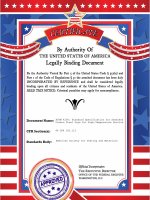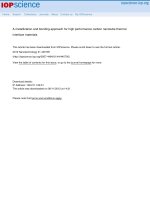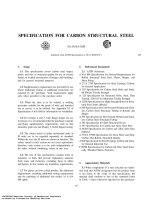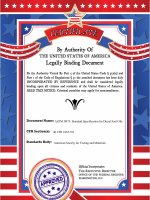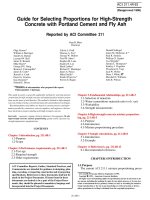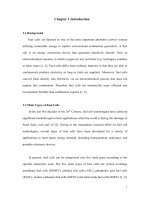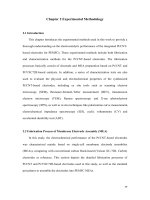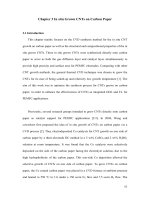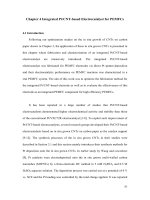ASTM D110-30 Specification for High Carbon Tar Cement
Bạn đang xem bản rút gọn của tài liệu. Xem và tải ngay bản đầy đủ của tài liệu tại đây (71.31 KB, 2 trang )
STANDARD SPECIFICATIONS
FOR
HIGH-CARBON TAR CEMENT1
A.S.T.M. 'Designation: D 110-30
These specifications are issued under the fixed designation D 110; the final
number indicates the year of original adoption as standard or, in the case of revision,
the year of last revision.
ISSUED AS TENTATIVE, 1921; ADOPTED IN AMENDED FORM, 1930.
1. These specifications cover material suitable for use in the con- Scope.
struction of tar macadam and tar concrete pavements.
2. The tar cement shall conform to the following requirements: Properties.
(a) Water ..................................... 0.00 per cent
(b) Softening point2 (Ring-and-Ball Method) ................ .
. . . . . . . . . . . . . . . . . . . . . . . . . . 30 to 40° C. (86 to 104° F.) 3
(c) Distillation test:
Total Distillate, by weight, 0 to 170° C. 1.00 per cent
(32 to 338° F.) ................... not more than
10.00 "
Total Distillate, by weight, 0 to 270° C. "
(32 to 518° F.) ................... not more than 20.00 "
80.00
Total Distillate, by weight, 0 to 300° C.
(32 to 572° F.) ................... not more than
Residue, by weight.......... . . . . . . . . . not less than
(d) Specific gravity at 38° C. (100.4° F.) of total distillate to
300° C. (572° F.) ............................... not less than 1.02
(e) Softening point (Ring-and-Ball Method) of residue from dis-
tillation test ....................... not more than 65° C. (149° F.)
1 Under the standardization procedure of the Society, these specifications are under the jurisdic~
tion of the A.S.T.M. Committee D-4 on Road and Paving Materials.
'If desired, a float test may be substituted for the softening point test, in which case the require·
ments shall be as follows: Float Test at 50° C. (122° F.), 100 to 220 sec.
aThe specification range for softening point, within the above limits, should be 5° C. for any given
locality, for example, 30 to 35° C. for cold climates, equivalent to a float test at 50° C. of 100 to 160
sec.; 35 to 40° C. for warm climates, equivalent to a float test at 50° C. of 160 to 220 sec.
(603)
604 SPECIFICATIONS FOR HIGH-CARBON TAR CEMENT
Methods of (f) Total Bitumen (Soluble in Carbon Disulfide) 1 ••••.••••••••
Testing. . . . . . . . . . . . . . . . . . . . . . . . . . . . . . . . . . . . . . 78 to 95 per cent
3. The properties enumerated in these specifications shall be
determined in accordance with the following methods of test of the
American Society for Testing Materials:
(a) Percentage of Water: Standard Method of Test for Water in
Petroleum Products and Other Bituminous Materials (A.S.T.M.
Designatioh: D 95) ;2
(b) Softening Point: Standard Method of Test for Softening
Point of Bitu1ninous Materials (Ring-and-Ball Method) (A.S.T.M.
Designation: D 36) ;3
(c) Distillation: Standard Method of Test for Distillation of
Bituminous Materials Suitable for Road Treatment (A.S.T.M. Desig-
nation: D ,20) ;4
(d) Float Test: Standard Method of Float Test for Bituminous
Materials (A.S.T.M. Designation: D 139) ;5
(e) Total Bitumen: Standard Method of Test for the Determina-
tion of Bitumen (A.S.T.M. Designation: D 4).0
1 The specification range for total bitumen covers a wide variety of materials. If products from
vertical retort or low~carbon coke-oven tars are desired, a range of 88 to 95 per cent should be specified.
If high-carbon coke-oven or mixtures of coke-oven and g11s-house tars are desired, a range of 78 to
88 per cent should be specified.
2 Seep. 556,
'Sec p. 650.
'Seep. 642.
• Seep. 660.
'Seep. 633.
